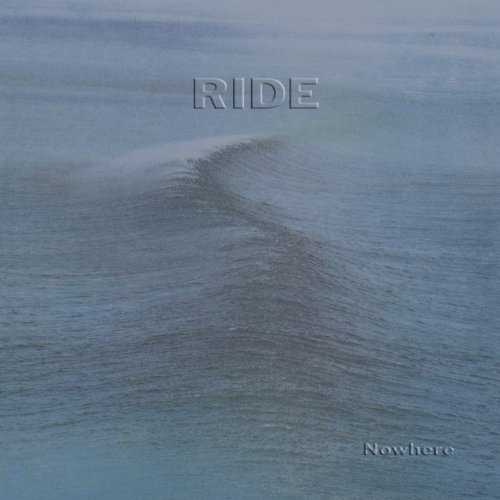Retrospectively, shoegaze came and went pretty quickly; a burgeoning squall in the mid 80s, peaking with critical adulations (including a vintage NME overhype) in the early 90s, only to dissipate and be carried on by nostalgic revivalists throughout the 2000s. It was a blurry eruption of Brit-centric ingenuity before being muddled by the imperialistic grunge movement and Oasis/Blur subplots. Besides the music, one of the most lasting documents of the time is the images – Loveless’ phosphorescent magenta, the pale, walking corpses of Souvlaki – the record sleeves summed up the incurved peculiarities of the aesthetic, far from any meddling human interaction.
But probably the best example is the cover of Nowhere. An ominous, uncrested wave in the midst of a darkened sea, blending perfectly with the frigid sky above – the single word ‘RIDE’ delicately embossed in the horizon. It gels so naturally with the music within, you almost wonder how the band was lucky enough to find it. The image represents everything about the genre’s brief emergence – a quiet, mystic, effect-drenched ocean – 20 years later its effect is still lucid.
Nowhere will always be talked about second to Loveless in terms of relics of the shoegaze era, but it will always be the most tangible. Ride was much more of a band than the scene’s other champions, and their music had a locatable, youthful heart. And 20 years later it still sounds great, fitting naturally into the canon of English rock, amounting to something much different than a prime example of an aesthetic. Occasionally Ride sounds like their post-humously assigned hype, perennial visionaries who mastered untamed soundscapes far beyond their years, but sometimes they just sound like a group of kids playing rock music inspired by more natural means: The Beatles, The Smiths, and, of course, The Jesus and Mary Chain.
It’s especially apparent on songs like “Seagull,” the warped opener that tumbles into amp-busting feedback screeches, copied lovingly from the ramshackle pop of, say, “Tomorrow Never Knows” – listening to the album now sounds like a menagerie of disembodied influences. “Dream Burns Down” is probably the sweetest take of Sonic Youth noise-rock you’ll ever hear, “Decay” is essentially a surf-rock jangle scuffed-up with some electronics, “Paralysed” relates an entire history of dreamy, honey-dipped pop in 5-minutes. Ride weren’t visionaries as much as they were a tirelessly creative group of individuals with a deep love for their record collections. It’s hard to call Nowhere a watershed moment, as much as an effortlessly substantial work of songcraft.
The 20th anniversary reissue adds a number of bonus tracks, as well as a live recording taken from a stateside performance at the Roxy in L.A. – both of great quality and adding a nice bulk to the relatively lean 8 songs that made up the original album. It’s a well-deserved tribute for a band whose relevance sometimes gets lost in the scheme of things – there will always be trepidations around calling Nowhere a stone cold classic, primarily because of the long, fertile shadows of peers like My Bloody Valentine – but I’d rather listen to Ride anyway. They’ve always had the earnestness and the knack for melody, which the abstruse sounds of their fellows never had.
The song everyone (including me) always circles back to is “Vapour Trail.” And for good reason, Andy Bell’s suspended whispers easily resonate, and his flighty, levitated guitar is among the best sounds ever laid to tape, but it also gives the band a poignant conclusion. “First you come so fast, then you fade away” Bell admits among sighing, melancholy strings. As Ride drifted listlessly into nonexistence in 1996 following a couple of ill-received albums these words seemed awfully ominous, but their saga wasn’t cataclysmic, in fact is was rather wispy, a vapor trail if you will. Flying high, barely in eyesight, gently disappearing with no real beginning and ending in nowhere, just like the song – Nowhere will always be the extent of Ride’s legacy, but the music within will keep it agreeably eternal.

